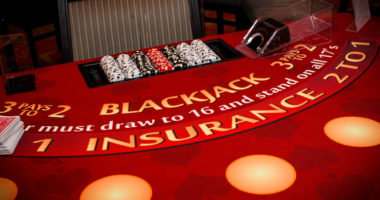Go directly to the content.

The Massachusetts Supreme Court has issued a ruling stating that gamblers at two in-state casinos cannot justify their complaints regarding blackjack payouts.
Both MGM Springfield and Encore Boston Harbor are set to benefit greatly from this decision, potentially saving both casinos tens of millions of dollars in annual payouts.
However, it is also a letdown for blackjack enthusiasts throughout the state who have been closely following the case’s development since 2019, which involved two separate lawsuits that were eventually merged. These players had hoped that the court would establish more lucrative payouts.
3:2 or 6:5? Discrepancy becomes sticking point
The focal point of the disagreement revolved around the appropriate rewards for gamblers who achieved a blackjack or 21 within the two casinos.
The cases had received varying outcomes before reaching the state Supreme Court. While a state court judge sided with the casinos, a federal judge rejected Encore’s motion to dismiss, leading to the matter being brought before Massachusetts’s seven justices.
The individuals who filed the cases contended that they deserved to receive payouts at a ratio of 3:2 ($150 for a $100 bet) upon winning a blackjack hand. However, they were instead provided with payouts at a ratio of 6:5 ($120 for a $100 bet).
When a player hits blackjack, their wins become more lucrative, even though winning bets still pay out at a 1:1 ratio.
The 6:5 variation is frequently offered in casinos that use player-friendly versions of the game, such as dealing one or two decks face down.
In contrast, a more traditional game with six or eight decks dealt face up offers 3:2 payouts, which are more favorable to the house.
In this particular case, though, the gamblers argued that the casinos were paying out 6:5 blackjacks while playing the standard, house-weighted game, which they believed to be against the rules.
The casinos countered by asserting that they were capitalizing on a loophole granted by the laws of Massachusetts, a stance that was subsequently supported by the state’s gaming commission.
According to Wynn Resorts officials, Encore Boston Harbor adheres to the blackjack payout regulations set by the Massachusetts Gaming Commission.
Despite the gamblers’ legal challenges, the lawsuits persisted mainly due to the commission’s rules being unclear on the issue until they were clarified in 2019.
‘Should have quit while they were ahead’
In spite of the confusing regulations set by the MGC, the Supreme Court ultimately issued a unanimous ruling stating that the casinos were well within their legal boundaries to provide 6:5 odds for the traditional style of gameplay.
“In a statement, Brown Rudnick, the legal representation for the casinos, declared that the decision delivered a significant triumph in the lawsuit that had garnered immense attention from the gaming industry and received extensive coverage from prominent media outlets across the country.”
If the ruling had been different, the casinos would have been responsible for paying out tens of millions of dollars annually.
Their current setups can remain as is, with 6:5 payouts on the ground floor and 3:2 on the upper high-roller floor. In the latter, players need to wager large amounts of money in order to improve their odds.
The primary problem favoring the casinos was the court’s ruling that the 6:5 payouts were clearly visible, even being prominently displayed on the felt of the tables at both MGM and Encore.
In the court’s opinion, Associate Justice Scott Kafker stated that the plaintiffs were unsuccessful in their final attempt. He advised them that they should have stopped while they were ahead.
He added that a player who is well-versed in the rules of blackjack and is aware of the distinctions between standard blackjack and the 6:5 variation would have easily noticed the significant aspects of 6:5 payout blackjack and realized that they were not engaged in the 6:5 variation.
Encore and MGM made the decision to run a game that favored the house, but they were honest and did not mislead players into thinking it would be more favorable to them.






